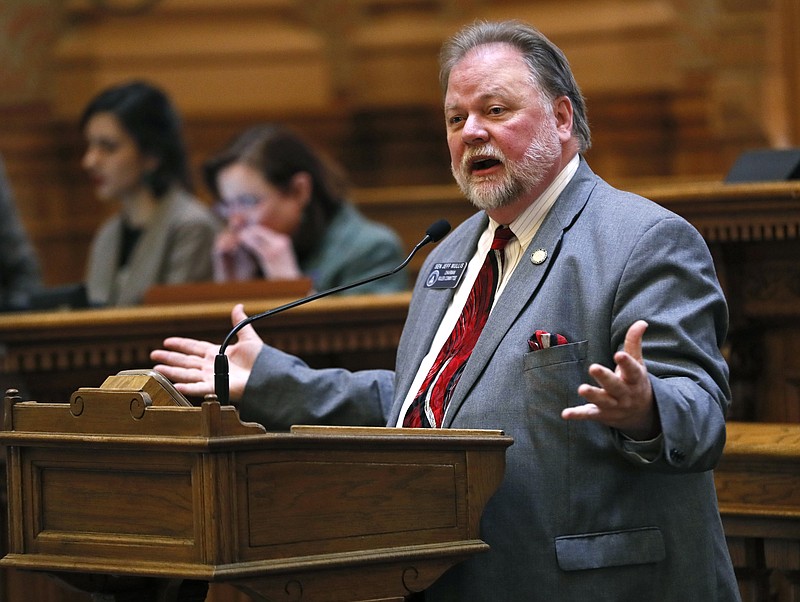Despite it not hitting the floor during Thursday's Crossover Day, Georgia state Sen. Jeff Mullis vowed that his bill banning secret recordings is still alive.
Mullis, R-Chickamauga, is not sure when the legislation might come up again, but he said Friday morning he is "working with many interested parties to perfect the bill." It last came up Feb. 19, when a Senate Judiciary subcommittee reviewed the proposal.
Mullis' bill would end the state's current law of one-party consent recordings, which means someone can secretly record others. The law became a prominent storyline last May when former Republican gubernatorial candidate Clay Tippins recorded Mullis' ally, then-Lt. Gov. Casey Cagle.
During a frank conversation, Cagle admitted to pushing "bad policy" to block potential funding from going to another political opponent. Cagle did not know he was being recorded. Though hard to pinpoint the precise impact, the leaked conversation probably hurt Cagle in his unsuccessful Republican primary runoff against Brian Kemp.
Mullis said earlier this year that his bill is not revenge for Cagle, though Tippins' recording brought problems with the law to his attention. The Georgia First Amendment Foundation and the ACLU have opposed his bill, arguing that secret recordings can lead to exposure of corruption and other public good.
Generally, Crossover Day is considered the last opportunity in a Georgia legislative session for a bill to pass at least one chamber. There are only 11 days left before the session ends.
Thursday saw fights over other high-profile bills.
The Senate passed legislation to authorize the state government to take over Hartsfield-Jackson International Airport from the city of Atlanta. The House, meanwhile, passed a severe restriction on abortions in Georgia, just as the Legislature in Tennessee did. If passed, the law would ban abortions if a doctor can hear a heartbeat. That normally happens at about 6 weeks into a pregnancy. In Georgia, abortions now are legal through the 20th week of pregnancy.
Some other bills died, including an effort to loosen restrictions on health care providers that have to receive certificates of need to expand, add expensive equipment and add hospital beds. The bill died after an original pitch to end the certificate of need process altogether.
Of the lawmakers from the northwest portion of the state, 11 of 28 bills have passed at least one chamber through Thursday. That includes Mullis' bill that both increases civil penalties for damaging monuments and bans the government from moving those monuments into museums.
State Sen. Chuck Payne's bill to allow Dalton Utilities to issue revenue bonds without a vote on a city referendum has also crossed over into the House.
State Rep. Kasey Carpenter's bill to let teachers and coaches participate with student-led prayer never received a committee hearing, though he filed the legislation in January. He filed another bill that would limit local restrictions on short-term vacation limits. But that, too, never got a committee vote.
One of Carpenter's bills, which would create a new criminal code for staging a vehicle crash, passed the House on Thursday afternoon.
State Rep. Colton Moore, a freshman from Trenton, still can drop two local acts on behalf of Dade County residents. The first will alter the structure of the local water and sewer authority board. The other will create a referendum, asking voters to amend the property school tax breaks for residents older than 65. While those residents now pay no taxes, the proposal would add a new requirement: Those property voters must live in the county for at least five years before receiving the benefit.
Moore's one major bill has gone nowhere this year. He proposed eliminating discipline reporting as a standard for school evaluations, arguing that it has caused teachers to ignore students who act out in class. The bill was assigned to the House Education Committee but never got a vote.
Moore said he is now looking at other bills that are still alive. He hopes to attach his legislation as a rider. He also has tried to apply pressure to Education Committee Chairman Rick Jasperse, asking teachers at a Georgia Association of Educators meeting last week to mass-email Jasperse, advocating for Moore's bill.
"He needs to hear from the teachers," Moore said.
Contact staff writer Tyler Jett at 423-757-6476 or tjett@timesfreepress.com. Follow him on Twitter @LetsJett.
